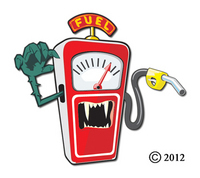Experian Automotive analysis shows impact of a $1 gas price increase
 |
SCHAUMBURG, Ill., Feb. 7, 2013 -- Experian Automotive today released findings from a study on the impact of rising fuel prices on various vehicle segments over a five-year period. The research showed that there was a direct correlation between fluctuations in gas prices and changes in market share for different types of vehicle sales.
Not surprisingly, the analysis showed the biggest market share gainer to be the Small-Car Economy segment. However, more interesting is how much this segment is affected. In the study, the Small-Car Economy segment rose by 0.7 percent for every dollar increase in fuel price. This means that if gas prices increased by $1, in an average month with 1 million unit sales, the Small-Car Economy segment volume would increase by 7,000 units. Conversely, the same price increase would cause the Full-Size Pickup Truck segment to lose 0.5 percent market share.
With approximately 18,000 new vehicle dealers in the country, these findings show that on average, a $1 spike in a gallon of fuel means every dealer in the nation could see one more Small-Car Economy vehicle sale approximately every three months.
"Everyone knows that a rise in fuel prices changes consumer purchasing behavior," said Erik Hjermstad, lead analytic consultant for Experian Automotive. "But, the question is, how are various segments influenced by a specific rise in fuel prices? In some cases, the shift in market share can be significant."
Another surprising trend was the impact on hybrid vehicles and electric vehicles. Sales of hybrid trucks actually fell by 0.1 percentage points. Hybrid cars went up by just 0.2 percentage points, and electric vehicle sales were up by only 0.1 percentage points. While these vehicles are still likely to be solutions to long-term transportation challenges, currently, there is low market demand, even when gas prices increase significantly.
"While higher fuel prices tend to get people talking, actual consumer behavior is affected primarily at the vehicle segment level. What this means for dealers is not necessarily a change in number of vehicles sold, but rather a shift in which vehicles people are buying," Hjermstad said. "Smaller cars definitely pick up market share, and full-size pickup trucks and SUVs definitely see a downturn. But, the magnitude of these shifts is also a function of how quickly gas prices increase or decrease."
Hjermstad also said that dealers who closely monitor their market and have a better understanding of the vehicle sales in their region will be in a better position to react to fuel price changes, making better business decisions that keep sales up and inventory at the right level to meet demand.
Experian Automotive will be discussing the latest analysis at the National Automobile Dealers Association (NADA) Conference, Feb. 8 to 11 in Orlando, Fla., Booth #1823.
About Experian Automotive
Experian Automotive provides information services and market
intelligence that enables results-driven professionals to gain the fullest
possible understanding of the market, the vehicles and the people who buy
them. Its North American Vehicle DatabaseSM houses data on
nearly 700 million vehicles and, when combined with Experian's credit,
consumer and business information, provides an integrated perspective into
the automotive marketplace. Experian Automotive's AutoCheck®
vehicle history reports provide dealers and consumers with in-depth
information, allowing them to confidently understand, compare and select
the right vehicles. For more information on Experian Automotive and its
suite of services, visit our Website at www.ExperianAutomotive.com.


